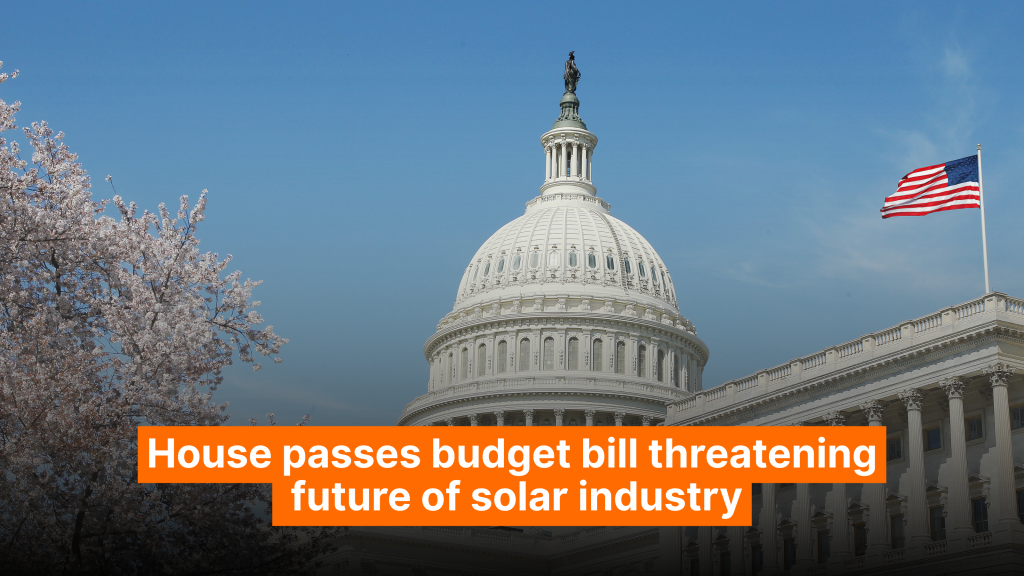The U.S. House of Representatives passed a revised federal budget bill early Thursday morning, introducing several last-minute amendments that could significantly disrupt both residential and utility-scale solar markets. According to Solar Power World, the updated legislation includes provisions that would eliminate key tax incentives, impose restrictive timelines on project development, and limit eligibility for clean energy incentives.
Key amendments in the revised budget bill
The updated bill introduces the following changes with wide-ranging consequences:
- Eliminates ITC eligibility for solar leasing companies: Companies like Sunrun would no longer be able to claim the federal Investment Tax Credit (ITC) under section 48E.
- Removes phase-outs for major tax credits: The bill eliminates scheduled phase-downs for both the ITC (48E) and the Production Tax Credit (PTC, 45Y), creating immediate and fixed deadlines instead.
- Imposes strict project timelines: Projects must both begin construction within 60 days of the bill’s enactment and be placed in service by December 31, 2028, to qualify for tax credits. Keith Martin of Norton Rose Fulbright estimates this means construction would need to start by early October 2025.
- Preserves start-of-construction tests: Projects can still qualify by either beginning physical construction or incurring 5% of total project costs.
- Accelerates foreign entity compliance deadline: Projects must now comply with the Foreign Entity of Concern (FEOC) restrictions by December 31, 2025.
- Bans credits for projects with “material assistance” from prohibited foreign entities if construction begins after December 31, 2025.
Residential solar hit hardest
Among the most controversial measures, the bill completely eliminates the residential Investment Tax Credit (25D) after December 31, 2025. This 30% tax credit has long been a cornerstone of residential solar adoption in the U.S. and has been extended multiple times in the past.
The Solar Energy Industries Association (SEIA) strongly criticized the bill. SEIA President and CEO Abigail Ross Hopper warned, “If Congress does not change course, this legislation will upend an economic boom in this country that has delivered a historic American manufacturing renaissance, lower electric bills, hundreds of thousands of good-paying jobs, and tens of billions of dollars of investments primarily to states that voted for President Trump.”
She added, “This unworkable legislation is willfully ignorant of the fact that deploying solar and storage is the only way the U.S. power grid can meet the demand of American consumers, businesses, and innovation. If this bill becomes law, America will effectively surrender the AI race to China and communities nationwide will face blackouts.”
Impact on domestic manufacturing
Although the final bill preserves the full value of the Advanced Manufacturing Production Tax Credit (45X) through 2029—with a phase-down starting in 2030—the solar manufacturing sector remains alarmed. The Solar Energy Manufacturers for America (SEMA) Coalition emphasized that the broader legislative changes still endanger domestic manufacturing.
SEMA Executive Director Michael Carr stated, “While we appreciate the endorsement of the Advanced Manufacturing Production Tax Credit by the House, this retroactive repeal — with many contracts in place for U.S.-made products through 2030 — undermines existing commercial agreements. The result will push developers back to buying overly subsidized Chinese products evading our trade laws, while raising electricity costs for everyone.”
He continued, “A vote for this bill was a vote to close U.S. factories and concede manufacturing jobs of the most important energy resource of the 21st century to China.”
What’s next?
The bill now heads to the Senate, where it is expected to face intense scrutiny and debate. The solar industry, already grappling with high interest rates and global supply chain issues, is bracing for potential fallout if the bill becomes law.

